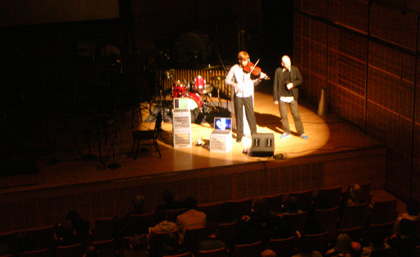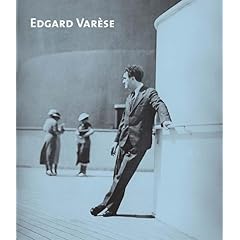Last night’s Green Umbrella concert of new music was the first concert in Los Angeles solely comprising Australian music, and it was a real success. As the second part of the Phil’s recognition of Dean as composer, he was given freedom to select the program and his own role. So we saw Brett Dean as composer, as performer on viola, as conductor, as commentator, as programmer, and — in all of these — as effective communicator. This was an evening that deserved to be recorded and made available for download so that more than the thousand in Disney Hall last night could hear this music and those performances. Dean, himself, is poorly represented on recordings. I find several including Dean as performer on viola, but only three containing a short composition each. To add to the pain, the most recent of these was a commission from the Berlin which is included on Rattle’s new release of Holst’s “Planets; the work, “Komarov’s Fall”, is on the recording — but Dean is not identified as composer so that an Amazon search on Dean will fail to find the work, and an iTunes search will locate the recording but fail to tell you which “song” is the reason for the match.
The major works of the evening were Dean’s. In the first half we heard his “Voices of Angels” (written in 1996, the oldest work on the program, as Dean pointed out). He wrote the work while still in Berlin, premiered by Berlin colleagues in the small hall of the Philharmonie. This work is for Schubert’s quintet: violin, viola, cello, bass, piano; by coincidence we heard the “Trout” on Monday night, and “Voices of Angels” (of similar length) could hold its own on a program including both, a program intended for less adventurous ears. I suppose the caveat is that the players must be good enough to handle the advanced techniques asked of them by Dean.
The climax of the second half of the concert was Dean’s “Pastoral Symphony” (2000), written on his return from Berlin to Australia and his rediscovery of Australian spaces and natural resources, specifically including its birds. Also impacting the piece was his recognition of the loss of environment from expansion and modernization; in the music a bucolic environment at the start of the work becomes largely supplanted by construction, by shopping centers, by freeways. The work is a 20-minute movement for a small chamber orchestra with prominent winds and percussion: 3 violins, 3 violas, 2 cellos, bass; flute, oboe, 2 clarinets, bassoon, 2 horns, 2 trumpets, trombone, tuba; 2 percussion, piano; sampler. I joined what seemed to be almost all of the audience in liking this work very, very much; however, as Dean told the audience, by a large margin this was the largest audience for a new music concert he had experienced — and the most responsive. We liked it. Salonen was just a few seats away; he like it, too.
The program began with the first U.S. performance of Liza Lim’s “Songs Found in Dream” (2005), commissioned by the Salzberg Festival and premiered by Klangforum Wien. Lim received a Phil commission, writing “Ecstatic Architecture” for the first season in Disney Hall. I wasn’t enthusiastic then, and the newer work last night didn’t communicate to me. My wife says the problem is with me; she said that the work clearly evoked the images in aboriginal art and in petroglyphs, and she was surprised I didn’t hear this. Lim’s web site includes music of three of her compositions.
For the second half of the program Dean introduced his younger (27) colleague, Anthony Pateras, who came on stage looking as if he’d much rather be in a club or a studio, and not in this large auditorium with audience sitting in orderly rows. (His web site gives a clue of why he might feel that.) He seemed much more relaxed when he returned on stage to acknowledge the continuing applause after his first work; later, after performing the second of two pieces, you could see him having his own “Sally Fields” moment: “They like me, they really like me!” I hope someone was taping this for his records, a few years from now.
The first Pateras piece was “Chromatophore” (2003) for amplified strings (2 of each instrument). The name comes from the pigment cell used to change colors by chameleons or fish. Through technique and amplification the work uses strings almost as percussion instruments; sustained tones (i.e., traditional string sounds) are minimized. The work was developed through improvizations, and while it now has a written structure, each player has cells in which independent playing is required. Within the approach of limiting sustained notes, the work explores the pitches of thee common diatonic scale. The music was challenging and stimulating.
Pateras’ solo work was a movement from a work-in-progress, “Continuums & Chasms, Movement vii”. This is for fully-prepared piano, in which each note of the piano is altered. For this work, Pateras seemed to structure the alterations into clusters: in some, sounding of a pitch was minimized; in others, the pitch and tonal color were altered in various ways, producing gong-like effects, for example. He uses very rapid fingerings as he moves across the keyboard, and the uses of different types of sound creates very interesting colorings. Both Pateras works were performed in U.S. premieres. I lack the language to convey how interesting these pieces were as music, not merely as sound.
The re-birth of Monday Evening Concerts is achieved! The brochure for the 2006-2007 season has been released and is shown on the web site. Four concerts! I only wish that at least one of the four concerts was for local new music and that another was for other American new music. My private campaign is for them to hire Kyle Gann as one of the curators. Well, maybe next year. Just having the program alive is accomplishment enough for now.

 About two years ago I was looking for a text for a song-cycle for baritone and piano. Having set Christina Rossetti and Rupert Brooke, I felt obliged to find a contemporary poet. I found much poetry that I liked and even began some settings of Yosef Komunyakaa. But nothing felt right. Then a friend of mine mentioned a poet whom I had never heard of: Kevin Davies. I rummaged around online (Davies being too obscure for most bookstores) and came upon his volume
About two years ago I was looking for a text for a song-cycle for baritone and piano. Having set Christina Rossetti and Rupert Brooke, I felt obliged to find a contemporary poet. I found much poetry that I liked and even began some settings of Yosef Komunyakaa. But nothing felt right. Then a friend of mine mentioned a poet whom I had never heard of: Kevin Davies. I rummaged around online (Davies being too obscure for most bookstores) and came upon his volume  seeing. Last winter, completely out of the blue, baritone Thomas Meglioranza e-mailed me having read about the piece on
seeing. Last winter, completely out of the blue, baritone Thomas Meglioranza e-mailed me having read about the piece on  For all the allusions to chaos and complexity in the American Composers Orchestra’s Orchestra Underground concert at Zankel on Friday night, the evening was a surpisingly mellow–dare I say it, even melodic–affair. If new music is going to be this much fun to listen to there is a real danger that people are going to start coming to concerts.
For all the allusions to chaos and complexity in the American Composers Orchestra’s Orchestra Underground concert at Zankel on Friday night, the evening was a surpisingly mellow–dare I say it, even melodic–affair. If new music is going to be this much fun to listen to there is a real danger that people are going to start coming to concerts. 

 Tonight’s joint performance at the
Tonight’s joint performance at the  But tonight, sitting through solo and duet renditions of Bach, Tartini, Bob Dylan, Fiona Apple, and others, one happily forgot the old complaints about virtuosity and sat back contentedly in the rush of arpeggios, trills, tremolos, and scales. One smiled at the clear joy Hahn and Thile took in collaborating with a fellow musical athlete of the first caliber, someone who could play along tight no matter how blazing the tempos dared. This isn’t to say the country whiz kid winging his way through the classics and the conservatory prodigy tentatively testing the waters of folk music always made for an effortless couple: Thile’s Bach got pretty runny, and Hahn’s bluegrass was a little green. But the super-abundance of talent on display more than made up for the moments of musical awkwardness. Hahn and Thile charmed and dazzled through the evening, and we all cheered. Both artists have new CDs out, and let’s hope they both sell lots and lots of them.
But tonight, sitting through solo and duet renditions of Bach, Tartini, Bob Dylan, Fiona Apple, and others, one happily forgot the old complaints about virtuosity and sat back contentedly in the rush of arpeggios, trills, tremolos, and scales. One smiled at the clear joy Hahn and Thile took in collaborating with a fellow musical athlete of the first caliber, someone who could play along tight no matter how blazing the tempos dared. This isn’t to say the country whiz kid winging his way through the classics and the conservatory prodigy tentatively testing the waters of folk music always made for an effortless couple: Thile’s Bach got pretty runny, and Hahn’s bluegrass was a little green. But the super-abundance of talent on display more than made up for the moments of musical awkwardness. Hahn and Thile charmed and dazzled through the evening, and we all cheered. Both artists have new CDs out, and let’s hope they both sell lots and lots of them.